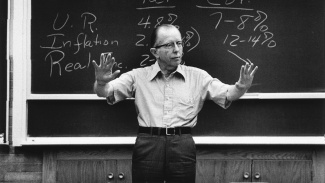Paul McCracken Advised Five U.S. Presidents, Developed Business Students

Many members of the University of Michigan business faculty have integrated public service into their careers along with teaching and research, but perhaps the most notable is the late Professor Paul McCracken.
A native of Iowa, McCracken worked as a researcher for the Federal Reserve while earning a PhD at Harvard. He joined the Michigan Business School faculty in 1948.
His obituary in The New York Times described his philosophy: “A wide-ranging thinker, Mr. McCracken was part of a postwar generation of economists who believed that government should play an active role in moderating business cycles, balancing inflation and unemployment, and helping the disadvantaged.”
A Presidential Economic Advisor
President Dwight D. Eisenhower was the first president to call upon McCracken’s expertise, appointing him to the Council of Economic Advisers in 1956. As related in the book Tradition, Vision, and Change: Business Education at the University of Michigan, 1900-2000, Eisenhower made his expectations clear: “The main thing is always to give us the straight dope. Let’s never start out by kidding ourselves.” McCracken served on the council for three years.
Although McCracken was a Republican, President John F. Kennedy named him to a task force on the domestic economy. Tradition, Vision, and Change recalls that McCracken would later tell the story of Kennedy telling him with a wink, while discussing a draft report, “You don’t write like a Republican.” Another Democrat, President Lyndon B. Johnson, later asked McCracken to serve on a commission on budgetary accounting.
McCracken’s most high-profile role in public service came as chairman of the Council of Economic Advisers for President Richard Nixon.
The Times recalled the challenges McCracken faced upon taking office in 1969: “Working for Nixon, Mr. McCracken was confronted with an inflation rate that had been rising since 1965, a byproduct of the deficits that the federal government had amassed during the Vietnam War. In a speech in August 1969, he said inflation had ‘caused severe social and economic damage’ and ‘had a socially disintegrating effect through its tendency to escalate group tensions.’ … Mr. McCracken became the architect of a policy of gradualism, which sought to slow inflation by reducing growth slightly, without causing a recession.”
According to a U-M obituary, Nixon wrote of McCracken in 1985, “During the most difficult hours of my first term…I came to depend on Paul both for his incisive intellect and his hard-headed pragmatism. He was a key adviser during a crucial time in our nation’s history.”
Nixon eventually imposed wage and price controls, which McCracken warned were unsustainable. He was ultimately proven right, the Times wrote, and they were abandoned in 1974. By the 1980s, he “concluded that high inflation had resulted from ‘a cumulative paralysis in our will’ and called for greater fiscal discipline to limit the growth of government spending,” the Times wrote.
McCracken rejoined the faculty in 1971, but he wasn’t quite finished with his government service: In the 1980s, he served on the Economic Policy Advisory Board of President Ronald Reagan — the fifth president to seek his counsel on economic matters.
“Paul McCracken has earned a deservedly high reputation in three different worlds: the academic, the governmental, and the business,’ famous economist Milton Friedman said in 1985. “Few academics have achieved so wide a range of influence.”
A Model Educator
Although the world remembers McCracken for his public service, at Michigan Ross his reputation as an outstanding faculty member is equally strong.
According to Tradition, Vision, and Change, he was known at U-M for his “personal warmth and wit.” Early in his faculty career, he received a U-M Distinguished Faculty Achievement Award. In 1966, he was named the Edmund Ezra Day Distinguished University Professor of Business Administration, one of just five distinguished professorships awarded that year.
“McCracken was a popular teacher, and students would pack his lectures,” the book recalled. “Often they would find their professor had decided to discuss a current economic issue instead of following the syllabus. Said McCracken, ‘My best hours (in the classroom) occurred because on the way there, I decided not to give the regular lecture.”
McCracken said that his experiences in Washington had a major impact on his teachings and research at the university. His U-M obituary recalled:
“There is merit in being able to bring to class true-to-life stories on the complicated process of running a government, especially on its economic policy,” McCracken once wrote. “To cast a stone is easy, but when one is involved in the process, it is easy to discern that application of economic theory is a highly complex matter, rarely deeply understood by the casual newspaper writer. Giving to classes the pragmatic and political nuances, both playing out simultaneously, was for me both invigorating and stimulating — or so I thought in discussions in the classroom.”
McCracken served on the boards of a number of companies and took leadership roles in economic organizations. According to his U-M obituary, he was awarded eight honorary degrees and gave more than 300 speeches. His research and commentary expertise spanned monetary policy, international trade, budgets, and economic strategy.
McCracken kept regular hours at the school long into his retirement. He often spent time in the Davidson Winter Garden, chatting with both students and faculty.
On the occasion of his 90th birthday, President Gerald Ford honored him in a letter, writing in part, “You and your family should be extremely proud of your many accomplishments and outstanding contributions to our great nation and the University of Michigan, which have been the beneficiaries of your unselfish, dedicated, and patriotic service.”
McCracken passed away in 2012 at age 96. “Professor McCracken was a national treasure, and we were fortunate to have him at Ross for so many years,” said Alison Davis-Blake, Edward J. Frey Dean and Stephen M. Ross Professor of Business, upon his passing. “Not only was he an excellent scholar, he was a worldly adviser who shared his wisdom with presidents in the White House and with students and colleagues in the Winter Garden … He set a wonderful example for our current faculty and students and is a testament to the enduring legacy of education.”







